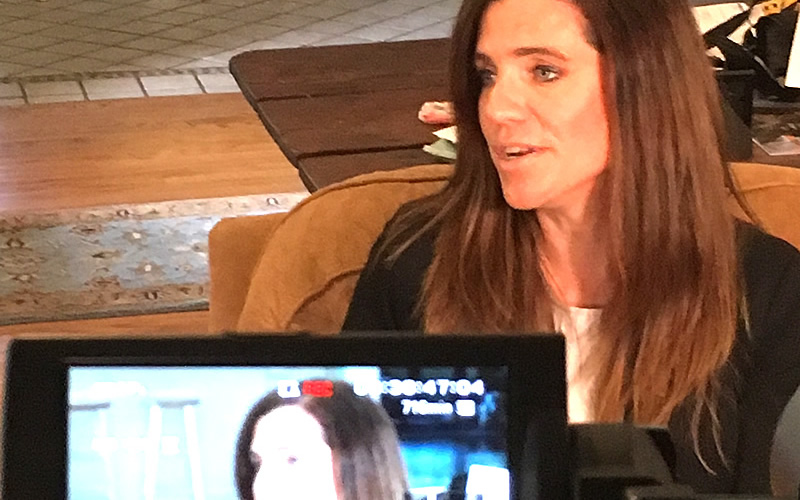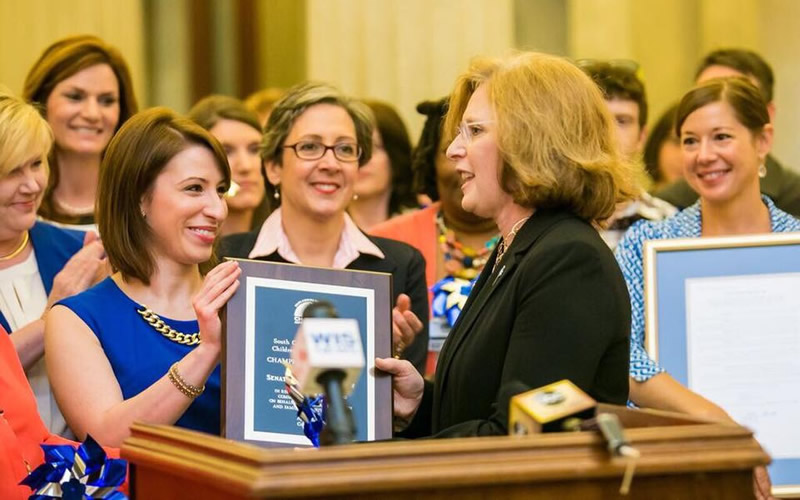
By Lindsay Street, Statehouse correspondent | Navigating tricky political terrain is just another day at the Statehouse for a distinct minority in elected office: Republican women.
In red South Carolina, there are two Republican women in the S.C. Senate (4 percent of the chamber) and 11 Republican women in the S.C. House (about 9 percent of the chamber). Republican men account for 54 percent of the Senate (25 of 46 members), and 56 percent of the House (69 of 124 members).
But while the few GOP women occupy powerful positions, their voices are powerful in both chambers and on both sides of the aisle.
“While we are small in number, we are pretty remarkable,” S.C. Rep. Nancy Mace, R-Daniel Island, told Statehouse Report this week. Before being elected to office, Mace already made history as a woman: she is the first female graduate of Charleston military college The Citadel.
In recent weeks, Mace was back in the news for impassioned remarks on rape and abortion on the House floor. She successfully amended a restrictive abortion ban to make exceptions for rape and incest. The so-called “fetal heartbeat” bill that would ban abortions after six weeks passed the House, but will wait for 2020 for the Senate to consider.
Conservative women nationwide and in the state tend to act as a moderating force in elected bodies, using personal experience to sway political action, according political scientists. And women tend to exert that power most on issues typically assigned to their gender: family, children and reproductive matters.
‘A very difficult terrain’

Mace said she is proud of her “100 percent pro-life voting record.” But she said she entered the recent abortion brouhaha because she wanted the bill to be more “in line” with the mainstream Republican Party by allowing exceptions. She talked on the floor about her personal experience with rape. Later, a fellow conservative lawmaker distributed anti-abortion material that called rape a “misdeed,” which put Mace on the offensive. Rep. Josiah Magnuson of Spartanburg apologized this week to Mace.
Of the 11 Republican women in the S.C. House, seven co-sponsored the bill. Mace was not a sponsor on the bill but the only female conservative to speak about it on the floor, which caught the attention of Statehouse observers.
“They’re trying to navigate a very difficult terrain, which is be a conservative but … they understand that rape victims shouldn’t be forced to have babies they don’t want to have,” College of Charleston assistant professor of political science Claire B. Wofford said. “It looks inconsistent … but it’s a way to please some kind of diametrically opposed groups.”
Women on the right

Wofford said any perceived “liberalism” among Republican women is relative.
“They are, at least a little bit, more pro-woman than their male colleagues,” she said.
For three years, S.C. Sen. Katrina Shealy, R-Lexington, served as the Senate’s only female lawmaker. Like Mace, she has had a strong anti-abortion record but has also pushed for exceptions to be included in restrictions.
Also like Mace, Shealy is no stranger to headlines that spotlight misogyny in the state. In her first years in office, she was called “a lesser cut of meat” by a colleague (the 2015 story still makes viral rounds on social media, prompting an entry in Snopes.com). She said those people, who want to prevent abortion exceptions and disparage women, are “something else,” but not true Republicans, despite finding a home in her party.
- In January, a pro-life activist made headlines for telling a group of S.C. lawmakers that women should not be allowed to serve.
But in the same conversation with Statehouse Report, Shealy acknowledged the uphill battle Republican women have within the party.
“Republicans have always been more conservative so they thought women should be home barefoot and pregnant and baking cookies and a lesser cut of meat — we’ve been there before,” Shealy said. “(While) the Republican Party has changed because there are more women in leadership roles, they just aren’t as advanced as the Democratic Party.”
‘A natural mantle’

Shealy said Republican women — and women in general — tend to be “the voice of reason.”
“Even if it’s not just on women’s issues,” she said.
But conservative women in Columbia and nationwide tend to keep their influence to traditional female roles, College of Charleston assistant professor of political science Karyn Amira said.
“Women tend to champion issues that are more unique to women,” she said.
Republican women don’t disagree. They only chair two of the S.C. Statehouse’s 28 standing committees, and those committees are well within the traditional views of women: the House Education and Public Works Committee chaired by Rep. Rita Allison of Lyman, and the Senate Family and Veterans Affairs Committee chaired by Shealy.
- PREVIOUS COVERAGE: This year, the Senate made history when an all-female subcommittee convened.
“We sometimes are looking at (serving) through a different lens because we are mothers, we’re grandmothers, we’re sisters,” S.C. Rep. Raye Felder, R-York, said. Felder serves as vice chair of the House Education and Public Works Committee.
Amira said Mace’s personal story of rape and her push for a rape exception in the fetal heartbeat bill is “a prime example” of lawmakers using personal experience to affect decision-making. Mace said her role as “a voice of reason and compassion” is “a natural mantle for women.”
Mace has also pushed for bills reforming the state’s divorce code and domestic violence laws.
In the Senate, Shealy has become child advocate guru among her colleagues.
“I fight for what’s in my heart, which may have something to do with my gender,” Shealy said. “Because I’m a female I think more about children’s issues and women’s issues, which I think is good because we have so many men that think about other things.”
She said her male colleagues often rally behind her causes or ask her opinion on such issues. She said it often takes a woman to bring a more family-centered issue to their attention.
“It’s not that the men didn’t care about it. It just wasn’t the thing that was jumping out to them,” Shealy said.
“Women are definitely different because we get more legislation passed, women get more things done and they usually … don’t have to talk as much,” Shealy said. She added that Republican women tend to be more successful reaching across the aisle.
- Have a comment? Send to: feedback@statehousereport.com















 We Can Do Better, South Carolina!
We Can Do Better, South Carolina!